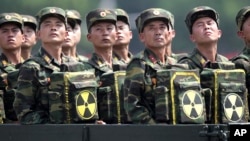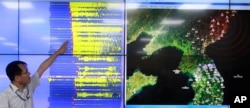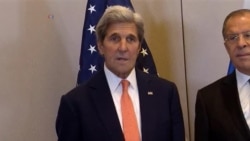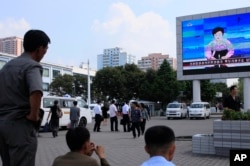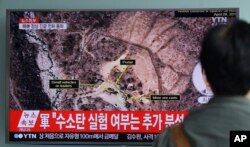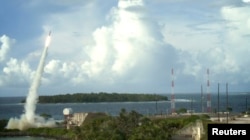North Korea Friday carried out its fifth nuclear test near its Punggye-ri test site, triggering a blast that seismic monitors indicated was its largest such detonation yet.
An announcer with North Korean state television KCNA read a statement from the Nuclear Weapon Research Institute of the DPRK that said it was a successful test of the country's capacity to create a nuclear warhead that can be miniaturized to fit on various types of missiles.
“This nuclear warhead explosion test is part of responsive measures to threats and sanctions from the U.S. and enemies denying our strategic position as a nuclear state,” The KCNA announcer said during the broadcast.
Pyongyang did not advise the international community in advance of its plans to conduct a nuclear test. On Monday, North Korea fired three ballistic missiles which flew about 1,000 kilometers before falling into the Sea of Japan, inside Tokyo's Air Defense Zone. Those launches were condemned by U.S., Chinese and other leaders who were gathered at the G-20 summit in Hangzhou, China.
September 9 marks the 68th anniversary of the founding of North Korea and Pyongyang has in the past marked important holidays by conducting nuclear and missile tests.
Biggest bomb yet
Friday's detonation was the country's fifth test since 2006, however it is the second one so far this year. North Korea has claimed the past two tests involved hydrogen bombs, which are much more powerful than atomic bombs. Analysts, however, said the January blast was not big enough to be a full thermonuclear explosion or "H-bomb."
South Korea’s meteorological agency said Friday’s test produced a 10-kiloton blast, nearly twice the power of the country's nuclear test in January but slightly less than the Hiroshima bombing, which was measured about 15 kilotons.
Jeffrey Lewis with the California-based Middlebury Institute of International Studies told Reuters that an earthquake of this magnitude would indicate a device with a 20- to 30-kiloton yield, which would be the largest yield estimate yet of a North Korean nuclear device.
South Korean President Park Geun-hye condemned North Korea for conducting its fifth nuclear test in violation of U.N. Security Council resolutions.
President Park, who is in Laos for the ASEAN security summit said this nuclear provocation,” proves Kim Jong Un's rabid recklessness to cling to nuclear development."
The South Korean president will leave the ASEAN summit early and return to Seoul to monitor the situation.
South Korean Prime Minister Hwang Gyo-ahn says Seoul will call for additional and stronger U.N. sanctions against North Korea.
“We are facing a grave situation which is totally different from the past when North Korea conducted nuclear tests once in three years. North Korea's nuclear and missile threats are clear and existential,” said Hwang.
Japanese Prime Minister Shinzo Abe said if a nuclear test is confirmed, it would be “something absolutely inadmissible” and that Tokyo would call for action from the U.N. Security Council.
"Japan is currently a member of the U.N. Security Council, so we will also work closely with New York, if this nuclear test was indeed carried out, to figure out how best to react to this situation," Abe said.
U.S. Secretary of State John Kerry said "at the appropriate moment today I am confident President (Barack) Obama will address this and we will certainly be discussing this in the context of the United Nations, I am sure."
WATCH: Kerry, Lavrov react to nuclear test
The top U.S. diplomat made the comment while in Geneva to discuss Syria with his Russian counterpart, Sergei Lavrov, who said, "We are very much concerned and the resolutions of the Security Council must be implemented and we will send this message very strongly."
The White House released a statement reiterating President Obama’s “unbreakable” commitment to allies in Asia and the world, and said the president will consult with other leaders to make sure North Korea’s provocations are met with “serious consequences.”
The Pentagon said the North Korean test was "yet another flagrant violation" of U.N. Security Council resolutions, as well as a "serious provocation."
The International Atomic Energy Agency said North Korea's nuclear test is a "deeply troubling and regrettable act."
Hua Chunying, a spokeswoman for the Chinese Ministry of Foreign Affairs said China "strongly" urges North Korea "to honor its commitment to denuclearization, comply with the relevant Security Council resolutions, and to stop taking any action that worsens the situation."
China's official Xinhua news agency urged all parties in the international community to exercise restraint following North Korea's latest nuclear test, saying that it is in nobody's interest for there to be chaos or war on the Korean peninsula.
NATO chief Jens Stoltenberg also expressed condemnation on Twitter.
Defiance
The United Nations in March imposed harsh new sanctions on North Korea for its continued and defiant violations of Security Council resolutions banning the country’s development of nuclear weapons and ballistic missiles.
Since the latest round of sanctions were imposed, Pyongyang has conducted 20 tests of short- and medium-range missiles, including submarine based launches, advancing its capability to reach the U.S. mainland with a nuclear strike.
The last missile test occurred during the G-20 summit of the world’s largest economies that took place in China and included the U.S., South Korea, Japan and Russia.
While the U.N. Security Council recently denounced North Korea’s repeated missile tests, it has not imposed any further sanctions.
Chinese officials have said they don’t want to impose crippling sanctions that could cause the collapse of the Kim Jong Un government, spark instability at the Sino, North Korea border and increase U.S. power and influence on the Korean peninsula.
At the same time, Chinese President Xi Jinping has voiced opposition to the U.S. Terminal High Altitude Area Defense (THAAD) missile system to be deployed in South Korea.
Capabilities
Last year, the U.S.-Korea Institute at the Johns Hopkins School of Advanced International Studies (SAIS) estimated that North Korea has enough plutonium and highly enriched uranium to build 10 to 16 nuclear devices and the nuclear fuel cycle capability to replenish and increase its nuclear stockpile.
North Korea has claimed it has successfully miniaturized a nuclear warhead to fit on the head of missile. While this claim has not yet been demonstrated, U.S. and South Korean military officials say they are developing defensive strategies based on the assumption that the North does possess this offensive nuclear capability.
Sanctions
The U.N. sanctions along with new unilateral measures from the United States, South Korea and other countries imposed in response to Pyongyang’s previous nuclear test and rocket launch this year have the potential to impose real economic pain over time.
WATCH: UN Chief Ban Ki Moon on nuclear test
International sanctions include suspending currency transfers and restricting the North’s lucrative mineral trade that had accounted for over half of the country’s $2.5 billion in exports to China alone.
South Korea cut all remaining ties with the North that includes closing the jointly run Kaesong Industrial Complex that employed over 54,000 North Koreans.
Beijing’s cooperation to enforce these international sanctions is considered crucial because 90 percent of North Korean trade flows either to or through China.
There have been reports that China has been lenient in enforcing the U.N. restrictions.
The U.N. ban on North Korean mineral exports includes a difficult to verify humanitarian exemption for coal and iron exports, as long as the profits are not used to fund the development of nuclear weapons or other illicit arms.
Washington also imposed unilateral sanctions that could also target Chinese and other international companies involved using North Korean labor abroad, which has become a lucrative source of income for the Kim government. The U.S. treasury is also authorized to seize the financial assets of any individuals or organizations involved in illicit activities with North Korea.
THAAD
After North Korea’s nuclear test in January, the U.S. brought in a B-52 long range bomber, capable of delivering nuclear weapons, and other fighter aircraft to conduct low level flights near the inter-Korean border.
South Korea and the United States are also moving forward to deploy the THAAD missile defense system on the Korean peninsula.
Chinese officials have objected to placing THAAD in the region, saying the system’s radar has the capability to spy into its territory.
Youmi Kim in Seoul contributed to this report.




